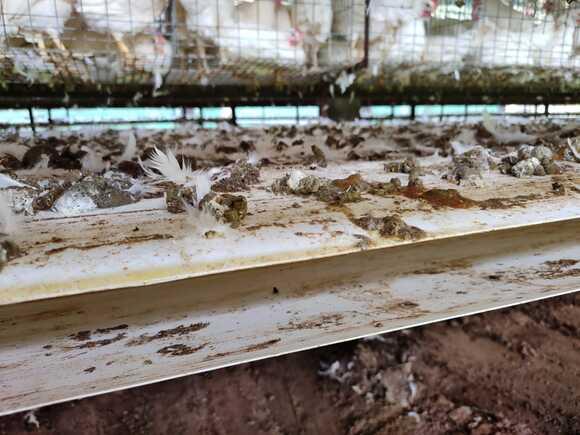Layer chicken loose/watery mucoid droppings
The problem of loose dropping is common in layer chickens and it is often regarded as bacterial enteritis/dysbacteriosis. Apart from coccidiosis, what are the practical field observations that a poultry veterinarian encounters?
It can be discussed here with the causes and treatment, including the management practices that have been observed and practiced. How Dysbacteriosis and Bacterial enteritis differ in the clinical outcome? What is your Observation?
High salt in the feed can promote loose droppings, so there is need to investigate and find out the cause. Feed contamination with molds or rancid feed can cause loose droppings besides bacterial, viral and other infections of the GI.
Tarusenga Munyanyi Back in the 2000s we had a lot of problems with mucoid yellow droppings particularly in free-range flocks. We carried out a survey on a large number of farms and found that these problems were primarily associated with Brachyspira species infections, B. pilosicoli, B. intermedia and B. innocens. See http://www.octagon-services.co.uk/poultry.htm enteric diseases section there are several articles there. They responded very well to the use of tiamulin, they are unlikely to respond to colistin unless the diarrhoea is caused by E. coli or salmonella spp.
David Burch ,
together with Wageningen CVI Lelystad (Central veterinary Institute) an investigation of balance is done on Gram- bacteria poultry and pigs. The MIC is investigated of different dosages essential oil combinations involved in Dysbacteriosis. A treatment in water or feed on the farm is very well possible without usage of antibiotics.
In Ireland, Germany and Holland treatments are very successful in case of Brachispira as well. Information from the report of investigation is available via info@AHCbv.com
Muhammad Hassan Yes, with a clause!
Colistin is an effective drug against some common enteric pathogens like Ecoli, salmonella and other gram negative ones which is however banned in most of the parts of the world, any bacterial enteric disorder caused by such pathogens can be definitely controlled by colistin but should be avoided.
Organic acids have been known to act by competitive inhibition of pathogens and are widely postulated to replace antibiotics to some extent moreover they will help by improving the digestion of nutrients such as protein by their pH reducing effects.
Muhammad Hassan yes we can.. in fact organic acids have been used for quite a long time for improving gut health.. the major advantage is increased villi to crypt ration up to a beneficial level.. and improvement in beneficial microflora.. colistin sulphate should be avoided due to many reasons in feed.
Watery diarrhea in poultry are multifactorial in a etiology and you have a differential diagnosis to arrive at the specific etiology.
The issue of heat induced watery droppings is a known fact in heat stress management to which we gave severally identified the role of homeostatic and osmoregulatory products like Betaine.
We should equally note that diarrhea of the nature defined in this discourses can also be seen in the absence of heat stress and which I think the various contributors have highlighted.
We have talked about high salt inclusion, use of high fiber diet like wheat or barley, inclusion of poorly processed Soya with antinutritional factors
Even heavy helminthiasis and the common bacteria enteritis, all result in watery diarrhea in laying birds.
There are infectious and no infectious causes of loose droppings in poultry. Excess water intake can lead to loose droppings. High fibre content of feeds, especially pelletized feed, can also lead to loose droppings, Bacterial infections like pasteurellosis, salmonellosis. Viral infection like new Castle disease, IBD can lead to loose droppings.
Respected all,
Let's consider 2 categories,
1) Infectious - The use of combination of Probiotic + good quality Organic acid at high dose 2-3 kg per ton and/or essential oil combination shall control the situation immediately.
2) Nutritional / Non infectious - Use of Phytogenics or Haloquinol, also Fenugreek soaked seeds can suppress the mucoid droppings,
In heavy cases, lomofen was my drug of choice for immediate effect, but ROI was low.
STODI which has tannins, Andrographoloids, punicalagins are much effective in controlling by anti secretory, anti inflammatory, anti peristaltic effect.
Brachyspira infection causes few signs except egg production drop and diarrhoea and it can respond to acidification of the water (or antibiotics)
Get a pig lab to help you diagnose it - they deal with it every day.
Together with Wageningen CVI Lelystad (Central Veterinary Institute) an investigation of balance is done on Gram- bacteria poultry and pigs. The MIC is investigated of different dosages essential oil combinations involved in Dysbacteriosis. A treatment in water or feed on the farm is very well possible without usage of antibiotics
In Ireland, Germany and Holland treatments are very successful in case of Brachispira as well. Information from the report of investigation is available via info@AHCbv.com.
Caecal droppings (yellow pasty mucoid droppings) in layers can be very common, caused by Brachyspira infections. We found them to be present in most free-range flocks, causing 20% drop in production and an additional 10% mortality if untreated. In cage sheds, flies seemed to be important in the transmission of the infection - faeces - flies - feed - and in many tropical countries they have open-sided buildings, which allow easy access to flies. We found tiamulin to be highly effective in treating the disease and the use of organic acids may also be used for prevention. There are several articles on my website http://www.octagon-services.co.uk/poultry.htm, which may be of help.
The condition of fecal droppings is an important indicator of health of birds for field veterinarians, farm supervisors and workers taking care of the flock. To reach a tentative etiology, one needs to categorize droppings.
First of all differentiate between diuresis and a loose dropping.
In case of DIURESIS, water tends to remain separate from fecal material. Diuresis is generally seen during hot weather, excess salt or when flocks are medicated with diuretics.
LOOSE DROPPINGS may be infectious or non-infectious in nature.
Non-infectious such as mycotoxins, excess fiber, poor quality ingredients. Antibiotics do not help in this category. Only solution is... remove the cause. Carminative agents/Herbal medicine may help.
Infectious causes such as spirochetosis (Borellia - yellow droppings), intestinal spirochetosis (Brachyspira - yellow droppings). Specific antibiotics required for treatment (consult area veterinarians).
DYSBACTERIOSIS is non-specific enteritis. Antibiotics enteric use (example enramycin, virginiamycin) for may help. Carminative agents/Herabal medicine may also help.
Obviously, loose droppings are not as simple subject and non-antibiotic treatments may also be considered.

My opinion: more and prolonged use of antibiotics may disturb normal flora or microbiome. This may be a cause of dysbacteriosis.
Natural solutions based on herbs and essential oils are showing very promising efficacy in countering the deleterious effect of loose dropping in poultry. Essential oils counter the pathogenic activity of harmful bacteria due to its anti-quorum sensing activity. The herbal phytogenic constituents and essential oils work in synergy to prevent and treat GIT related problems in poultry and pigs.
Salcochek Pro (powder) and Liq-biotic (liquid) are two such types of solutions which also contain electrolytes. some of the important Herbs along with their phytoconstituents present in Salcochek Pro are Acacia catechu, Holarrhena antidysentrica, Plantago ovata, Berberisaristata, etc. Some important essential oils are mint oil, eucalyptus oil, etc. Phytoconstituents along with essential oils helps to normalize the transit time through different sections of the gastrointestinal tract & time required for the material to move through the digestive tube. Herbs of Salcochek Pro and Liq-biotic help to check the presence of various pathogens including E. coli, Salmonella, etc. and improving gut microflora, which is useful to prevent from Enteritis, toxin production, diarrhea & associated symptoms. Salcochek Pro has already proven its efficacy in preventing and treating enteritis in poultry and pigs.
There are multiple causes of loose droppings. You can only differentiate among these if you know the proper history of the flock. We should go with multiple treatment as there is high germ load in our farm conditions so we can not rule out infectious origin of the cause . Better to use betain containing products along with electrolytes and vitamin C and also can use probiotics like lactobacillus along with organic acids.








.jpg&w=3840&q=75)



























